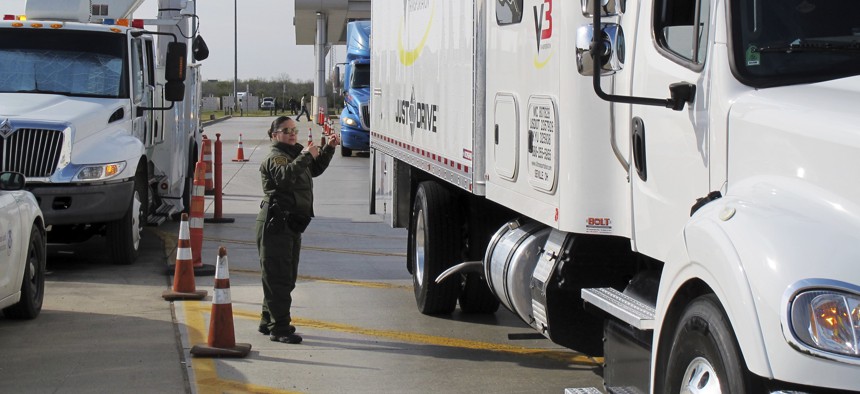Mayor in Busy Texas Border Town Warns of Fallout From Trade Dispute

Border Patrol agent Gracie Briones waves through a tractor-trailer after it passed through an X-ray machine at the Laredo North checkpoint in Laredo, Texas, on Friday, February 2, 2018. AP Photo/Nomaan Merchant
Pete Saenz, mayor of Laredo, called on federal officials to tamp down uncertainty over tariffs and trade pacts.
The mayor of Laredo, Texas on Wednesday stressed the economic importance of international trade for communities on the nation’s southern border, and urged lawmakers to beef up investments in ports of entry like the bustling one located in his city.
Mayor Pete Saenz, as well as other officials representing groups with an interest in trade and ports, appeared before a Senate Finance subcommittee at a time when the Trump administration has staked out a number of confrontational positions on trade.
"The widening U.S. trade war with Mexico, with Canada, Europe and China threatens sustained economic growth,” Saenz told the panel.
“Congress and the White House need to end tariff uncertainty and improve NAFTA,” he added, referring to the North American Free Trade Agreement, which went into effect in 1994.
The mayor noted that Laredo’s border crossing is the busiest land port of entry in the U.S., and the second busiest in the nation overall after California’s Port of Long Beach. He testified on behalf of the Texas Border Coalition, which represents communities in that region.
For months, the Trump administration has been in negotiations with Canada and Mexico over reworking NAFTA. President Trump is also engaged in disputes over tariffs with Europe and China.
Sen. John Cornyn, the Texas Republican who chairs the Senate Finance subcommittee on International Trade, Customs, and Global Competitiveness, said Treasury Secretary Steven Mnuchin told him recently that his hope was that the NAFTA talks could be completed quickly, now that this year's elections in Mexico have taken place.
During the hearing, Cornyn asked Sergio Contreras, chair of the Border Trade Alliance, what the effect would be if NAFTA were scrapped, an idea President Trump has floated.
“It would put at risk close to 382,000 jobs in the state of Texas alone,” Contreras said in his reply.
Cornyn said he and other lawmakers remain “determined, not only to get a solution to some of our broken immigration system, but also to make sure that while we secure the border, we also make sure that we can facilitate legitimate trade and commerce.”
“It’s the lifeblood of that region, certainly, and of our country,” he added.
(Earlier in the day, Cornyn, the no. 2 GOP member in the Senate, said he thought that a bipartisan immigration bill Senate lawmakers had been working on was “dead,” CNN reported.)
Saenz said increases in the flow of goods through ports of entry, along with security measures put in place after the Sept. 11, 2001 terrorist attacks, have led to longer border crossing wait times. He cited estimates indicating the delays cost the U.S. up to $5.8 billion annually.
The mayor endorsed a number of programs involving inspections and special lanes meant to speed up wait times at the border, while also voicing support for increasing the overall number of inspection lanes, raising the number of staff, and deploying new technology.
Border inspections aim to detect drugs and other contraband, as well as attempts to smuggle people into the U.S. illegally.
Bill Lucia is a Senior Reporter for Government Executive's Route Fifty and is based in Washington, D.C.
NEXT STORY: Census Bureau Fumbles a 'Foundational' Part of the 2020 Trial Run






